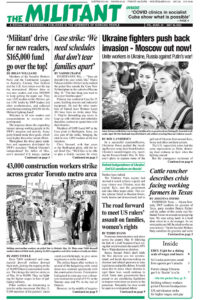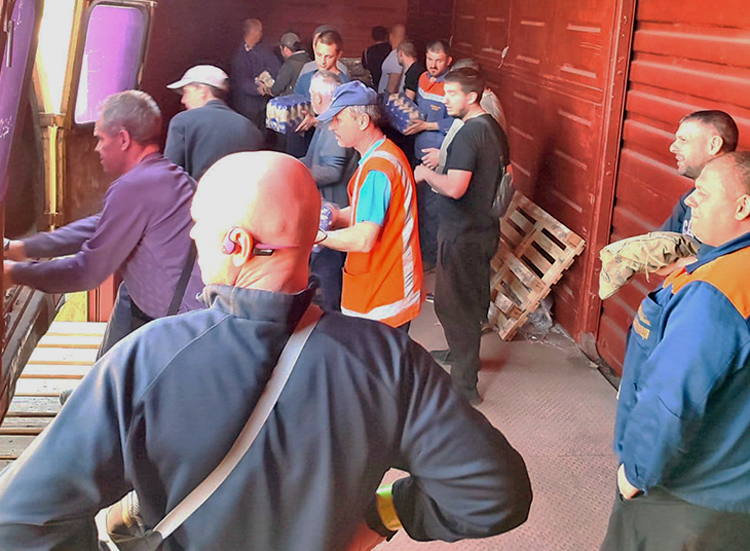Workers and their unions in Ukraine are joining in the fight to defeat Moscow’s invasion of their country, while standing up to assaults on jobs, wages and working conditions by bosses who are backed by the government of President Volodymyr Zelensky.
Working people have been at the forefront of resistance to the Russian invasion, from protests in occupied cities like Kherson to signing up as combatants in the Ukrainian army and territorial defense forces.
“At least 15% of miners volunteered for the military,” Mikhailo Volynets, president of the Confederation of Free Trade Unions of Ukraine, told the Militant by phone from Kyiv May 2. At the Pavlograd coal mine in the Donbas area owned by billionaire Rinat Akhmetov, 800 out of 4,000 workers are now in the army fighting the invasion.
“The war has destroyed a large part of the economic and social infrastructure of Ukraine,” Volynets said. “Rail lines, communications and bridges were destroyed by Russian forces. There is increasing inflation.” Gross national product has fallen by 50%, he says, and millions lost their jobs.
While fierce resistance by working people has pushed Moscow’s troops out of large parts of the country, Putin’s forces have doubled the area they control since the invasion, especially in parts of southern Ukraine.
Workers fight on two fronts
Oleksandr Skyba, a rail worker from Kyiv and a member of the Free Trade Union of Railway Workers, described the work his union is doing at a solidarity conference held in Lviv May 5-6.
Rail lines and depots are being bombed as Moscow tries to disrupt the movement of Ukrainian weapons and troops, and many rail workers have been killed by the invaders. Nonetheless, workers continue to move supplies to front line troops, the hardest hit cities and contested areas, Skyba said, as well as transporting those displaced by the war.
Yurii Samoilov, a leader of the Independent Trade Union of Miners of Ukraine in Kryvyi Rih, who addressed the conference via Zoom from Kryvyi Rih, described efforts there. He noted that unions have been crushed in the Moscow-controlled “People’s Republics” of Donetsk and Luhansk in eastern Ukraine. Health care workers there have been forced to join Moscow’s state-controlled unions and take serious pay cuts.
Pavel Oleshchuk, spokesperson of the Atomic Workers Union, told the gathering that the Zaporizhzhia nuclear power plant — the largest in Europe — and the adjoining town of Enerhodar, are still under Russian occupation.
Ukraine has three uranium mines and a processing facility. Now the mines are closed. But to prevent them from flooding, water has to be continuously pumped out. As of early May, Oleshchuk reported, workers at the mines had still only been paid part of what they were owed for March.
Martial law and curfews imposed by Zelensky — including the banning of some meetings and protests — have increased the challenges.
The youth organization of one of the nuclear workers unions in Chernobyl issued a statement on May Day, noting that the martial law measures suspending union contracts has “greatly and negatively affected the financial situation and quality of life” of workers. Working conditions have deteriorated along with cuts in wages. “We are against any violations and restrictions of workers’ rights!” the youth organization said.
On May 12 parliament passed a new labor relations bill that makes it easier for bosses to reassign workers, as well as to fire those unable to get to work because of Moscow’s invasion.
In a statement released that day, Volynets noted the authors of the law seek “to please employers by significantly reducing the rights of workers.”
According to the law, laid off workers and those who have been displaced by the war “have a right to get social benefits,” Volynets told the Militant. “But because of the heavy burdens on the budget due to the war, there is a delay in getting payments. And some employers act like real capitalists. Even in wartime they want to get not only profits, but extra profits. That’s why a strong trade union is needed.”
Unions are finding ways to push back.
Some 2,700 workers at the Chernobyl Nuclear Power Plant continue to make sure the radioactive disaster site is carefully monitored to prevent further leaks and other related tasks and to repair extensive damage caused by Moscow’s troops who occupied it for over a month.
After Moscow’s forces were driven out of the site and the nearby town of Slavutych, where most of the workers live, bosses at the plant announced that under martial law they were terminating 314 workers who had not come in to work.
The union proposed some 160 of the workers who live in nearby Chernihiv, and could not commute because of the effects of the war, be kept on the payroll. The union proposed they join in the cleaning up and rebuilding of Chernihiv, which has been hard hit by bombings by Moscow’s forces. The bosses agreed.
Solidarity by Belarus unions
Unions in Ukraine have been getting solidarity from unions in Belarus, which is ruled by a dictatorial regime closely allied to Moscow. Rail unionists there organized to disrupt the movement of Russian troops and materiel into Ukraine. At least 14 leaders of the independent union movement in Belarus have been arrested for opposing the invasion.
“We are grateful to our courageous and principled Belarusian brothers and sisters,” Confederation of Free Trade Unions of Ukraine said in statement, demanding their immediate release.


